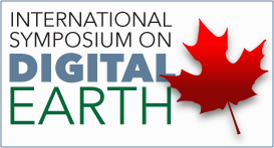
On 5-9 October 2015 delegates from around the world came to Halifax to participate in the 9th International Symposium on Digital Earth – “Towards a One-World Vision for the Blue Planet.” As a concept, Digital Earth aims to virtually represent the planet’s environments and social systems in a geographical framework for various research applications. The goal of the symposium was to explore the Digital Earth theory, technologies, applications, big data, and ultimately understand the role of Digital Earth in research.
Shelby McLean, one of the EIUI’s researchers, presented the paper “Coastal Web Atlases for Coastal Policy and Decision-Making: A Study of Four Operational Atlases” during one of the symposium’s breakout sessions. This paper, co-authored with Bertrum MacDonald, was based on Shelby’s Master of Marine Management research. The paper (see abstract below) focused on the role of coastal web atlases in policy and decision-making. Such atlases are digital, interactive mapping tools which contain a wide variety of data that can be layered on a map surface allowing users to visualize how activities may interact or conflict with one another. The symposium session was attended by about 80 delegates.
Other highlights from the Digital Earth Symposium included several outstanding keynote speakers: Michael Goodchild (University of California, Santa Barbara), Guo Huadong (Chinese Academy of Sciences), Dawn Wright (University of California, Santa Barbara), Rob Kitchin (National University of Ireland Maynooth), Rebecca Moore (Google), Rear-Admiral John Newton (Maritime Forces Atlantic), Douglas Wallace (Dalhousie University); James Boxall (Dalhousie University), Lynn Moorman (University of British Columbia), David S. Green (University of Toronto), and Deren Li (Chinese Academy of Sciences and the Chinese Academy of Engineering). The symposium also included engaging workshops, and tours and excursions highlighting Nova Scotia’s exceptional topography. The location of the next Digital Earth conference has yet to be determined, but the symposium will occur in 2017.
Abstract
Information plays a key role in evidence-based science policies. Many pressing environmental decisions need to be made at local or regional levels, but several factors may enable or prevent decision-makers from receiving and using environmental information. For example, Nova Scotia is a coastal province with many different activities and resources occurring in its marine areas. Correspondingly, many different stakeholders are involved in generating and using marine data and information around the province. However, no single tool presently exists to amalgamate the wide variety of data and information that exists in Nova Scotia. Coastal web atlas tools have been suggested to aid with information management as well as coastal policy and decision-making.
By interviewing users and developers associated with four recently developed coastal web atlases in different jurisdictions (Maryland, Massachusetts, Scotland, and British Columbia), this research addressed the following question: are coastal web atlases proving to be a useful tool for data management as well as coastal policy and decision-making? The results from this study indicate that users and developers in these four jurisdictions find their respective atlases useful for several reasons, including: increased transparency through the open access nature of the data, increased decision-making confidence, and the ability to easily access a wide variety of credible information in a single location. Interviewed users and developers noted that the following factors contribute to the success of coastal web atlases in local and regional decision-making: high quality metadata, understanding audience and user group, and iterative and incremental development.
Author: Shelby McLean
